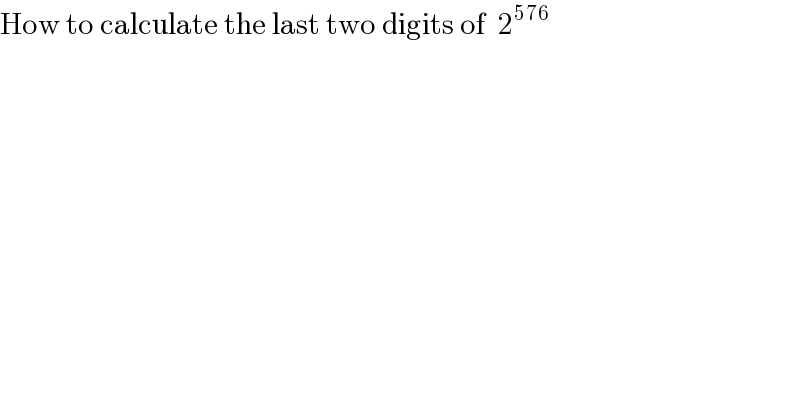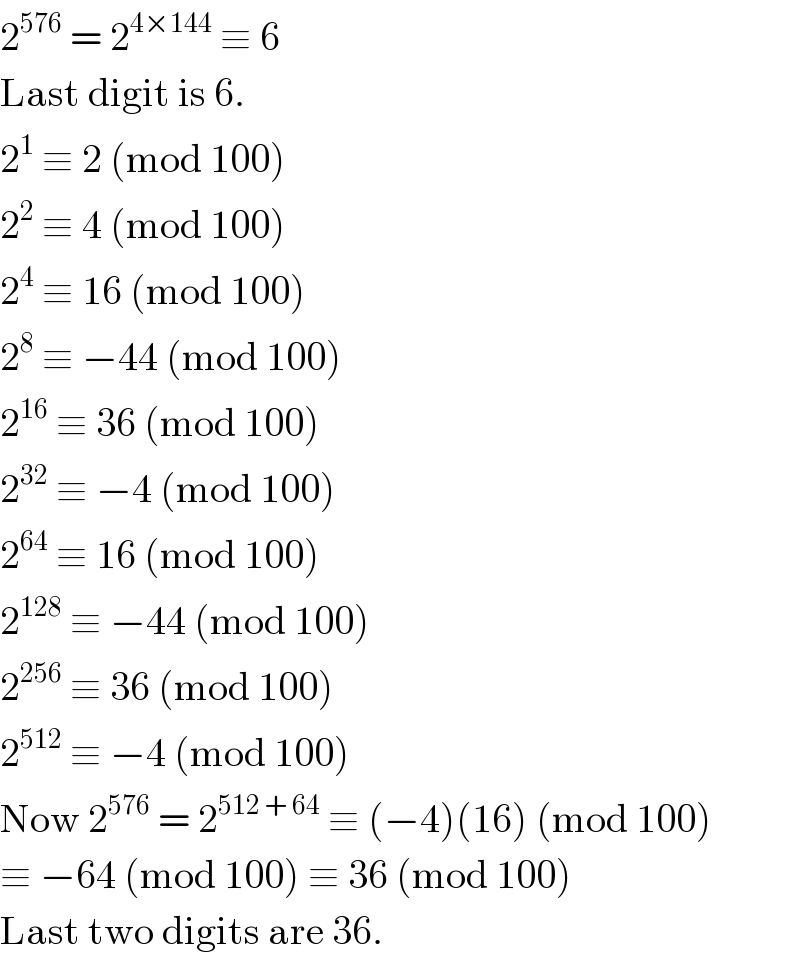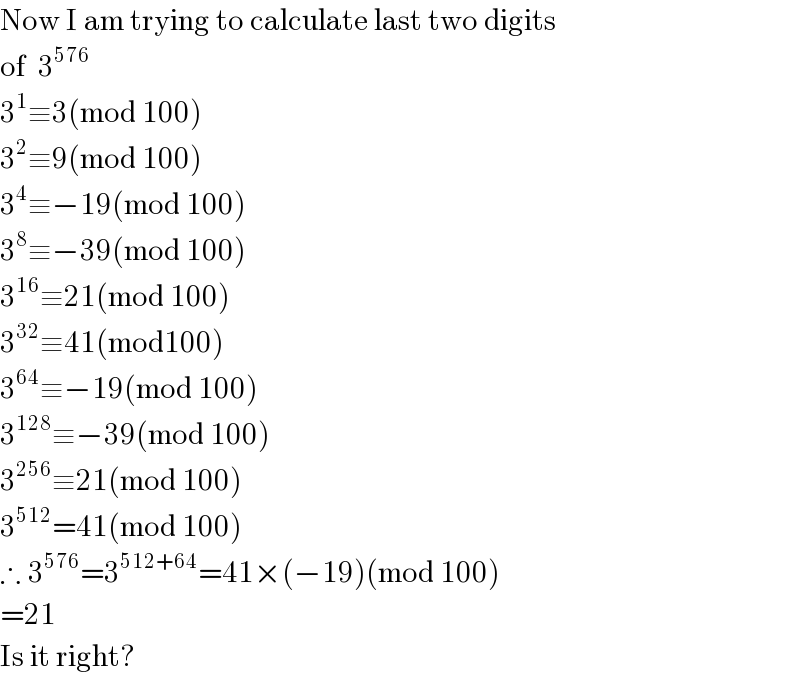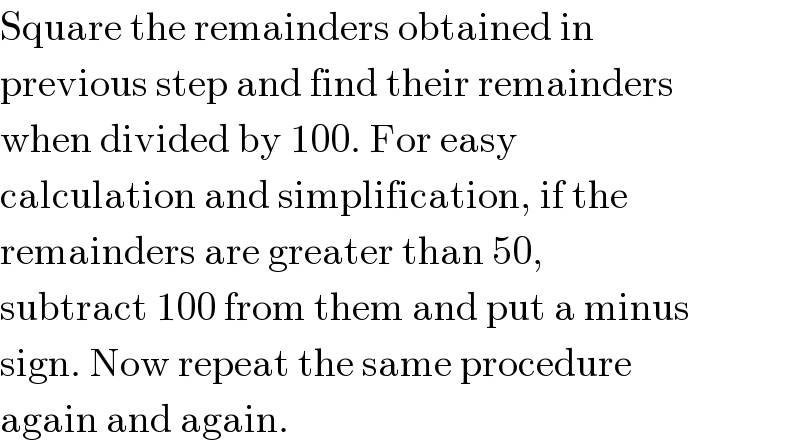
Question Number 15770 by arnabpapu550@gmail.com last updated on 13/Jun/17

$$\mathrm{How}\:\mathrm{to}\:\mathrm{calculate}\:\mathrm{the}\:\mathrm{last}\:\mathrm{two}\:\mathrm{digits}\:\mathrm{of}\:\:\mathrm{2}^{\mathrm{576}} \\ $$
Answered by Tinkutara last updated on 14/Jun/17

$$\mathrm{2}^{\mathrm{576}} \:=\:\mathrm{2}^{\mathrm{4}×\mathrm{144}} \:\equiv\:\mathrm{6} \\ $$$$\mathrm{Last}\:\mathrm{digit}\:\mathrm{is}\:\mathrm{6}. \\ $$$$\mathrm{2}^{\mathrm{1}} \:\equiv\:\mathrm{2}\:\left(\mathrm{mod}\:\mathrm{100}\right) \\ $$$$\mathrm{2}^{\mathrm{2}} \:\equiv\:\mathrm{4}\:\left(\mathrm{mod}\:\mathrm{100}\right) \\ $$$$\mathrm{2}^{\mathrm{4}} \:\equiv\:\mathrm{16}\:\left(\mathrm{mod}\:\mathrm{100}\right) \\ $$$$\mathrm{2}^{\mathrm{8}} \:\equiv\:−\mathrm{44}\:\left(\mathrm{mod}\:\mathrm{100}\right) \\ $$$$\mathrm{2}^{\mathrm{16}} \:\equiv\:\mathrm{36}\:\left(\mathrm{mod}\:\mathrm{100}\right) \\ $$$$\mathrm{2}^{\mathrm{32}} \:\equiv\:−\mathrm{4}\:\left(\mathrm{mod}\:\mathrm{100}\right) \\ $$$$\mathrm{2}^{\mathrm{64}} \:\equiv\:\mathrm{16}\:\left(\mathrm{mod}\:\mathrm{100}\right) \\ $$$$\mathrm{2}^{\mathrm{128}} \:\equiv\:−\mathrm{44}\:\left(\mathrm{mod}\:\mathrm{100}\right) \\ $$$$\mathrm{2}^{\mathrm{256}} \:\equiv\:\mathrm{36}\:\left(\mathrm{mod}\:\mathrm{100}\right) \\ $$$$\mathrm{2}^{\mathrm{512}} \:\equiv\:−\mathrm{4}\:\left(\mathrm{mod}\:\mathrm{100}\right) \\ $$$$\mathrm{Now}\:\mathrm{2}^{\mathrm{576}} \:=\:\mathrm{2}^{\mathrm{512}\:+\:\mathrm{64}} \:\equiv\:\left(−\mathrm{4}\right)\left(\mathrm{16}\right)\:\left(\mathrm{mod}\:\mathrm{100}\right) \\ $$$$\equiv\:−\mathrm{64}\:\left(\mathrm{mod}\:\mathrm{100}\right)\:\equiv\:\mathrm{36}\:\left(\mathrm{mod}\:\mathrm{100}\right) \\ $$$$\mathrm{Last}\:\mathrm{two}\:\mathrm{digits}\:\mathrm{are}\:\mathrm{36}. \\ $$
Commented by arnabpapu550@gmail.com last updated on 14/Jun/17

$$\mathrm{What}\:\mathrm{is}\:\left(\mathrm{mod}\:\mathrm{100}\right)\:? \\ $$$$ \\ $$
Commented by arnabpapu550@gmail.com last updated on 14/Jun/17

$$\mathrm{How}\:\mathrm{to}\:\mathrm{calculate}\:\mathrm{3}^{\mathrm{576}} \:? \\ $$
Commented by Tinkutara last updated on 14/Jun/17

$$\mathrm{Remainder}\:\mathrm{when}\:\mathrm{a}\:\mathrm{number}\:\mathrm{is}\:\mathrm{divided} \\ $$$$\mathrm{by}\:\mathrm{100}.\:\mathrm{You}\:\mathrm{can}\:\mathrm{proceed}\:\mathrm{in}\:\mathrm{the}\:\mathrm{same} \\ $$$$\mathrm{way}\:\mathrm{for}\:\mathrm{3}^{\mathrm{576}} . \\ $$
Commented by arnabpapu550@gmail.com last updated on 15/Jun/17

$$\mathrm{Now}\:\mathrm{I}\:\mathrm{am}\:\mathrm{trying}\:\mathrm{to}\:\mathrm{calculate}\:\mathrm{last}\:\mathrm{two}\:\mathrm{digits} \\ $$$$\mathrm{of}\:\:\mathrm{3}^{\mathrm{576}} \\ $$$$\mathrm{3}^{\mathrm{1}} \equiv\mathrm{3}\left(\mathrm{mod}\:\mathrm{100}\right) \\ $$$$\mathrm{3}^{\mathrm{2}} \equiv\mathrm{9}\left(\mathrm{mod}\:\mathrm{100}\right) \\ $$$$\mathrm{3}^{\mathrm{4}} \equiv−\mathrm{19}\left(\mathrm{mod}\:\mathrm{100}\right) \\ $$$$\mathrm{3}^{\mathrm{8}} \equiv−\mathrm{39}\left(\mathrm{mod}\:\mathrm{100}\right) \\ $$$$\mathrm{3}^{\mathrm{16}} \equiv\mathrm{21}\left(\mathrm{mod}\:\mathrm{100}\right) \\ $$$$\mathrm{3}^{\mathrm{32}} \equiv\mathrm{41}\left(\mathrm{mod100}\right) \\ $$$$\mathrm{3}^{\mathrm{64}} \equiv−\mathrm{19}\left(\mathrm{mod}\:\mathrm{100}\right) \\ $$$$\mathrm{3}^{\mathrm{128}} \equiv−\mathrm{39}\left(\mathrm{mod}\:\mathrm{100}\right) \\ $$$$\mathrm{3}^{\mathrm{256}} \equiv\mathrm{21}\left(\mathrm{mod}\:\mathrm{100}\right) \\ $$$$\mathrm{3}^{\mathrm{512}} =\mathrm{41}\left(\mathrm{mod}\:\mathrm{100}\right) \\ $$$$\therefore\:\mathrm{3}^{\mathrm{576}} =\mathrm{3}^{\mathrm{512}+\mathrm{64}} =\mathrm{41}×\left(−\mathrm{19}\right)\left(\mathrm{mod}\:\mathrm{100}\right) \\ $$$$=\mathrm{21} \\ $$$$\mathrm{Is}\:\mathrm{it}\:\mathrm{right}? \\ $$
Commented by arnabpapu550@gmail.com last updated on 14/Jun/17

$$\mathrm{How}\:\mathrm{can}\:\mathrm{you}\:\mathrm{get}\:\mathrm{2}^{\mathrm{256}} ,\:\mathrm{2}^{\mathrm{512}} \:\mathrm{etc}\:? \\ $$
Commented by Tinkutara last updated on 15/Jun/17

$$\mathrm{Square}\:\mathrm{the}\:\mathrm{remainders}\:\mathrm{obtained}\:\mathrm{in} \\ $$$$\mathrm{previous}\:\mathrm{step}\:\mathrm{and}\:\mathrm{find}\:\mathrm{their}\:\mathrm{remainders} \\ $$$$\mathrm{when}\:\mathrm{divided}\:\mathrm{by}\:\mathrm{100}.\:\mathrm{For}\:\mathrm{easy} \\ $$$$\mathrm{calculation}\:\mathrm{and}\:\mathrm{simplification},\:\mathrm{if}\:\mathrm{the} \\ $$$$\mathrm{remainders}\:\mathrm{are}\:\mathrm{greater}\:\mathrm{than}\:\mathrm{50}, \\ $$$$\mathrm{subtract}\:\mathrm{100}\:\mathrm{from}\:\mathrm{them}\:\mathrm{and}\:\mathrm{put}\:\mathrm{a}\:\mathrm{minus} \\ $$$$\mathrm{sign}.\:\mathrm{Now}\:\mathrm{repeat}\:\mathrm{the}\:\mathrm{same}\:\mathrm{procedure} \\ $$$$\mathrm{again}\:\mathrm{and}\:\mathrm{again}. \\ $$
Commented by Tinkutara last updated on 15/Jun/17

$$\mathrm{Yes}! \\ $$
Commented by arnabpapu550@gmail.com last updated on 15/Jun/17

$$\mathrm{Thank}\:\mathrm{you}\:\mathrm{very}\:\mathrm{much}. \\ $$
